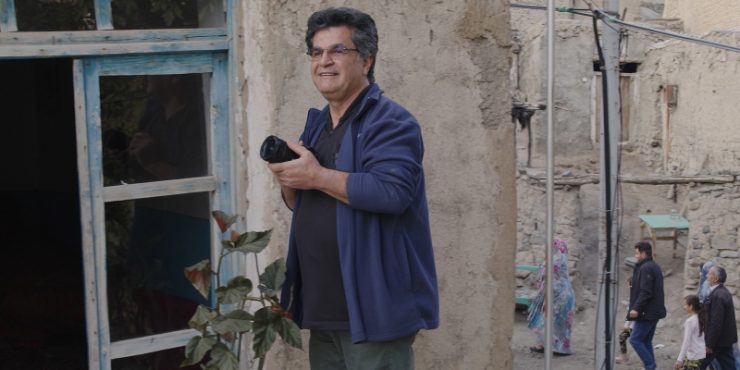It’s said that limitations can fuel creativity. No living filmmaker has taken more credence in that theory than Iranian director Jafar Panahi, a filmmaker whose persistence and prolific output hasn’t ceased even after being legally banned from making films by the Iranian government over ten years ago. It doesn’t appear that Panahi ever took the ban seriously. Soon after it happened he made the cheekily-titled This is Not a Film which came out in 2011, a thought-provoking piece of protest as motion picture. His films since, all made illegally, have been marked by their defiance, and Panahi’s own plight is hard to disentangle from the drama of his narratives. No Bears is his latest film, a meta-textual masterpiece about the cost of rebellion and the consequences of seeking spiritual autonomy in a society that refuses it.
Panahi plays himself, a filmmaker under intense scrutiny from the government attempting to make a film that reflects the draconian nature of the Iranian regime. He directs remotely, away from the set, through a laptop feed, giving his assistant director (Reza Heydari) notes and suggestions. His latest project is a Casablanca-esque tale about a couple of political dissidents (Mina Kavani, Bakhtiar Panjei) visiting a border town, attempting to procure passports that will allow them to travel to Europe and escape oppression. Panahi could direct from his home in Tehran, but he chooses to rent a home in the provincial village, risking his own imprisonment in order to be as close to the filmmaking as possible. His rental is owned by Ghanbar (Vahid Mobaseri), a man both impressed by Panahi’s artistic merit and skeptical of his political leanings.
Much like This is Not a Film, a lot of No Bears becomes about about the practical elements of making a movie against the order of the government. The restrictions so severe, Panahi can hardly do more than stay in his rental, looking at footage both from the shoot as well as from his own photography within the village. When a domestic drama overtakes the village, Panahi unwittingly becomes the center of it thanks to some photographs he may or may not have taken. He finds that the rural lands outside his urban home of Tehran have their own forces of power that wish to crush personal expression, their extremism motivated by tradition and superstition, as opposed to political tyranny. Making a film about love versus autocratic persecution, Panahi himself becomes a figure that stands between a vicious mob and a young couple hoping to escape the punishments of an intolerant society.
There’s a deceptive playfulness throughout this film, with humor interlaced between the interactions of the principled Panahi and the earnest, but servile Ghanbar. Their relationship – polite and gracious but shaded by distrust – is one of the movie’s central metaphors: Panahi wants to recreate reality in his films but occasionally dismisses the reality that stands in front of him. His principles make him instinctually resistant to the quickly-formed group of indignant men that come to his door. The accelerated nature of their indignation only confirms Panahi’s fears of fundamentalist suppression. They say that he has photographic proof that a young woman has betrayed her betrothed, but he swears he does not. No Bears keeps the details fuzzy because in the end whether or not he’s telling the truth matters little. The regime has already decided who is guilty and who is innocent. All that’s left is gathering the evidence necessary to confirm it.
If you’re reading this, then you probably already know that, between shooting this film and releasing it earlier this year, Panahi was himself imprisoned by the government for “propaganda against the regime”. No Bears was not envisioned to have this kind of cultural context, but Panahi’s own fraught political situation has always been a latent theme throughout his films. Knowing that he’s gone from banned director to political prisoner just gives the moral choices throughout No Bears greater weight, like a nightmare come to life. A lot of No Bears is meant to be absorbed in the moment, and writing about it feels hollow in the face of simply watching it. The film’s ending – the best, most devastating conclusion to any movie this year – will leave you breathless, undone by Panahi’s masterful structure. It’s another Panahi protest film, but one that grapples heavily with the human stakes of what revolution means.
Written, Produced & Directed by Jafar Panahi










